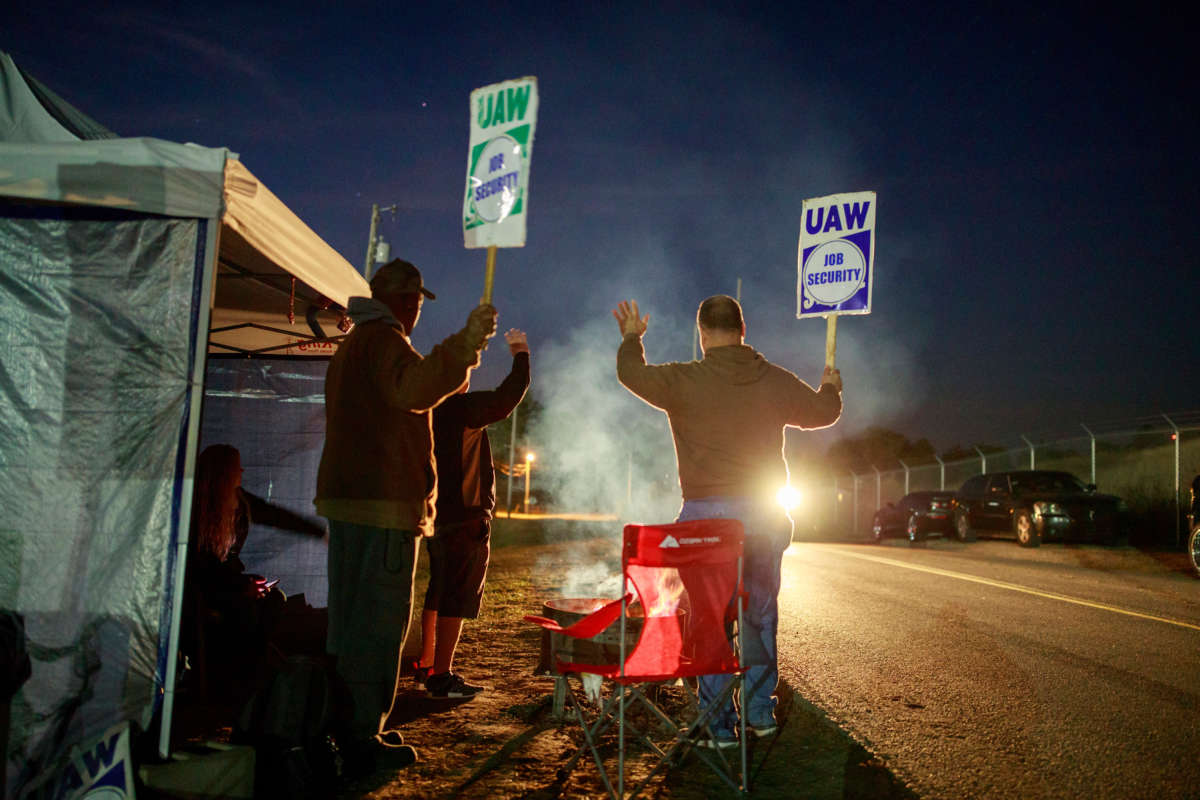A proposal to help democratize voting within United Auto Workers (UAW) has overwhelmingly won in a referendum vote, marking the end of the union’s decades-old delegate voting system.
The proposal, known as “one member, one vote,” will allow union members to vote directly for members of the 13-member UAW International Executive Board, which is responsible for overseeing the union with over 600 locals across eight regions. As of Wednesday night, the direct voting system officially had enough votes to pass, with 63 percent of votes for the measure and 37 percent for delegate voting. About 84 percent of the votes were counted.
For the past 70 years, the 400,000-member union has had a delegate voting system in which members elect representatives to vote in a monitored convention. Critics of this system say that it has fomented corruption within the union, giving strong partiality to incumbent board members and those favored by the Administration Caucus; this system has essentially led the union to one-party rule.
Advocates say that the one member, one vote system could lead to a more diverse board with a system of checks and balances. Campaigners for the new style of voting have also said that this would lead to results that are more representative and more equitable for union members.
Sheila Kulkarni, a graduate worker at the University of California and member of UAW Local 2865, Santa Barbara, told Truthout that one member, one vote will be “a tremendous win for the entire UAW.”
“With the passage of direct elections, UAW has a chance to rebuild its fighting spirit and catch up to the resurging American labor movement,” they added.
Some advocates say that the voting system reform will usher in an era of change for the union. The results show that members are “rejecting the behavior and practices of the entrenched political caucus and welcoming a new, unchartered territory to reshape the UAW into a viable union that we so desperately need,” said Frank Hammer, former president of UAW Local 909 and retired UAW-General Motors representative.
Early this year, the referendum was mandated by a consent decree by the Department of Justice after a federal investigation found that 11 ranking officials, including two former union presidents, participated in embezzlement, racketeering and bribery, which earned the union a reputation of being rife with corruption. Last year, the Justice Department slammed the UAW for failing to “address the fraud, corruption, and illegality problem within its own ranks” in what may be one of the largest union scandals in U.S. history.
Officials and staff spent over a million dollars of the union’s money on luxuries like vacations in Palm Springs and cigars. Between 2009 and 2016, leadership also accepted over $3.5 million in bribes from Fiat Chrysler to shortchange workers in the bargaining process.
Unite All Workers for Democracy (UAWD), a proponent of reforming the voting system, celebrated the results of the election on Wednesday and noted that there is more work to be done. “The work of our caucus is just beginning. We invite all UAW members to join us in our fight against concessions, corruption, and tiers. We will build a union based on solidarity, not partnership with management,” said UAWD chair Scott Houldieson in a statement.
Advocates also celebrated the results. “Lately, the current delegate system has helped fuel a lot of corruption within the UAW, where a small group has maintained power through intimidation and other unethical practices,” said Connor Gorman, a UAWD member and former trustee at UAW Local 2865, which represents students within the University of California system. “Switching to a direct voting system for the IEB is the first of many steps toward making the UAW a stronger, more militant, and more democratic union.”
The vote comes during a consequential time for the labor movement, with a strike wave rippling across the country. Such a change at the UAW, one of the largest unions in the U.S, could not only usher in a new era for the union but also mark an important milestone in what appears to be a moment of transformation for the labor movement, advocates say.
Academic workers — who comprise about one-fifth of the union’s members — have been a strong organizing force behind the drive for reform. The largest academic unit within the union, Local 2865, voted decisively for one member, one vote, with 80 percent of votes cast for the measure. Graduate student workers have sought membership with the UAW in response to a lack of other organizing resources for students and a failure of industrial unions to organize workers within their respective industries.
Our most important fundraising appeal of the year
December is the most critical time of year for Truthout, because our nonprofit news is funded almost entirely by individual donations from readers like you. So before you navigate away, we ask that you take just a second to support Truthout with a tax-deductible donation.
This year is a little different. We are up against a far-reaching, wide-scale attack on press freedom coming from the Trump administration. 2025 was a year of frightening censorship, news industry corporate consolidation, and worsening financial conditions for progressive nonprofits across the board.
We can only resist Trump’s agenda by cultivating a strong base of support. The right-wing mediasphere is funded comfortably by billionaire owners and venture capitalist philanthropists. At Truthout, we have you.
We’ve set an ambitious target for our year-end campaign — a goal of $119,000 to keep up our fight against authoritarianism in 2026. Please take a meaningful action in this fight: make a one-time or monthly donation to Truthout before December 31. If you have the means, please dig deep.
